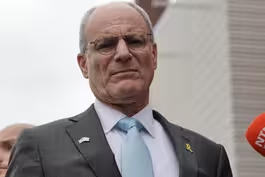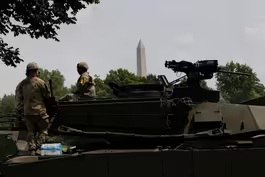
Capehart and Ponnuru on Israel's attack and Iran's response
Clip: 6/13/2025 | 11m 43sVideo has Closed Captions
Capehart and Ponnuru on the politics of Israel's attack and Iran's response
Washington Post associate editor Jonathan Capehart and National Review editor Ramesh Ponnuru join Amna Nawaz to discuss the week in politics, including Israel's attack and Iran's response has Washington and the rest of the world concerned about war between the two regional powers and the Trump administration's response to protests against immigration raids.
Problems playing video? | Closed Captioning Feedback
Problems playing video? | Closed Captioning Feedback
Major corporate funding for the PBS News Hour is provided by BDO, BNSF, Consumer Cellular, American Cruise Lines, and Raymond James. Funding for the PBS NewsHour Weekend is provided by...

Capehart and Ponnuru on Israel's attack and Iran's response
Clip: 6/13/2025 | 11m 43sVideo has Closed Captions
Washington Post associate editor Jonathan Capehart and National Review editor Ramesh Ponnuru join Amna Nawaz to discuss the week in politics, including Israel's attack and Iran's response has Washington and the rest of the world concerned about war between the two regional powers and the Trump administration's response to protests against immigration raids.
Problems playing video? | Closed Captioning Feedback
How to Watch PBS News Hour
PBS News Hour is available to stream on pbs.org and the free PBS App, available on iPhone, Apple TV, Android TV, Android smartphones, Amazon Fire TV, Amazon Fire Tablet, Roku, Samsung Smart TV, and Vizio.
Providing Support for PBS.org
Learn Moreabout PBS online sponsorshipAMNA NAWAZ: Israel's attack on Iran and Iran's response has Washington and the rest of the world holding its breath for an all-out war between the two regional powers.
To discuss that and more, we turn now to the analysis of Capehart and Ponnuru.
That is Jonathan Capehart, associate editor for "The Washington Post," and Ramesh Ponnuru, editor for "The National Review."
David Brooks is away this evening.
It's great to see you both.
JONATHAN CAPEHART: Hey, Amna.
RAMESH PONNURU, Senior Editor, "The National Review": Thank you.
AMNA NAWAZ: Let's start overseas with the lead story tonight, this moment in time, Jonathan, where we saw these unprecedented strikes by Israel on Iran.
We're seeing the extraordinary response by Iran and, more broadly, a region that has been getting more and more unstable over the last several months.
How are you looking at that?
JONATHAN CAPEHART: Well, I'm looking at that with great trepidation.
I mean, basically since October 7, the region has been roiling.
And at the center of it is Prime Minister Netanyahu, who understandably going after Hamas in Gaza, but then opening other fronts within the Middle East.
And this attack on Iran, it just strikes me that he is doing things that I'm not sure the president of the United States is totally bought in.
I'm not sure whether the United States -- whether he's either listening to American officials, who at least at one point the president was pleading, hey, don't do anything, hey, Iran, come to the table, and then switching once the attack started, saying, I'm all for it.
But the big thing here is, between what Netanyahu has done with Iran, coupled with what Prime Minister -- President Zelenskyy of Ukraine did in terms of not cluing in the United States in the big operation that they did inside, deep inside, Russia, makes me wonder, where's the United States in all of this?
Leave Trump out.
Have world leaders decided to just not think about the United States, not involve the United States simply because of who is in the Oval Office?
And when it comes to -- they were negotiating right now a new Iran nuclear deal that I -- Ramesh, maybe you can tell me.
Who's at the table with the Trump administration in these negotiations?
Because when President Obama was doing it, it was called the P5-plus-one.
You had China, France, the United Kingdom, the United States, Russia, plus Germany.
Those are the allies.
Where are the allies in all of this?
AMNA NAWAZ: Ramesh, to that point, these are conflicts Jonathan has listed President Trump said he was going to end on day one.
They have gotten worse.
We're opening up a new front here now in this war.
How do you look at that, President Trump's involvement, and, to Jonathan's point, the U.S. influence in the world right now?
RAMESH PONNURU: Well, it seems to me that Trump has kept his options open.
Today, Trump has been more or less taking credit for the Israeli strikes.
Last night, Secretary of State Marco Rubio took a more measured tone, where he was largely approving, but also keeping the United States at a distance from Israel's actions.
I strongly suspect that, if these actions by Israel had backfired in a big way, that the administration would have said, hey, we tried to warn you, we said we wanted peace, and this is not our doing.
But I think Israel has a very strong sense of itself having to take care of itself.
For at least two decades now, Israel and Netanyahu, in particular, has been warning about a nuclear Iran.
And I think what's happened after October 7 was that Israel has decided to make a strategic revolution in the region that has been largely successful.
One of the reasons I think we are seeing this strike is that Iran is at a weak point, and there's just no better time to make this strike as a result.
And then, at the same time, of course, you have got the nuclear threat, with the IAEA saying that enrichment has been accelerating by Iran.
Put those things together, and I think that this is something that Netanyahu wanted to do for a long time, and this was the time to do it.
AMNA NAWAZ: Jonathan, is this President Trump leaning into the moment now, taking advantage of what's clearly been Israel really reshaping a lot of the threats in the region, even when you look at the Iranian proxies, keeping his options open, and maybe, as he says, getting Iran to the negotiating table?
JONATHAN CAPEHART: I mean, who -- I don't know, Amna.
The guy, yes, he keeps his options open.
But is that the way to make policy in a region that is roiling right now, where you have a president of the United States who hedges his bets so much so that he can be on the side of the winner, as defined by him?
That's not a way to try to achieve peace or bring stability to a region that desperately needs it.
I mean, the -- and I go back to what I was saying before.
The United States used to be the stabilizing influence at the negotiating table and certainly within the region.
And, right now, the United States is as much a wild card, particularly with this president, as, say, the prime minister.
In this regard, given what you were just saying, it seems as though Prime Minister Netanyahu is the one who is the rational being, the person with a clear agenda and a clear goal.
And he's got a president of the United States who will bend to whomever he thinks is coming out on the good side, from his perspective.
RAMESH PONNURU: But we should also point out that Israel has often been independent of the United States.
That was true during the Biden and Obama years.
It was true during the George H.W.
Bush years as well.
The strike on Osirak was not something that they coordinated with the Reagan administration.
So this is -- there is plenty of precedent for Israel acting in its own interests.
AMNA NAWAZ: Outside of that, the Trump efforts towards diplomacy, which is what he seemed to be leading with, right, he can end the Ukrainian war, he can end the war in Gaza, and now there's a new front, have those now failed?
RAMESH PONNURU: I don't know how many people ever took those seriously Trump did repeatedly say that he was going to end Ukraine in one day, as though to get that message across.
AMNA NAWAZ: You never believed him?
RAMESH PONNURU: And since then, since he's taken office, he's basically been, oh, I -- that was more kind of metaphorical.
(LAUGHTER) AMNA NAWAZ: We will follow that as it continues to play out.
I do want to ask you about, of course, what's unfolding right back here on -- in the United States, and we're seeing the Trump administration response to those protests in Los Angeles, but other cities as well, against the immigration raids.
We saw him send in federal troops to California, against Governor Gavin Newsom's wishes.
We know that he's fighting in court to be able to keep them there, and that legal battle is unfolding.
But he's also threatening, Jonathan, to send troops to more cities.
What does all of this tell you about how the president views the use of federal troops and the military and also this priority of mass deportations as part of his agenda?
JONATHAN CAPEHART: OK, well, one, the priority of mass deportations was crystal clear during his campaign, so crystal clear that, during the convention, you may remember, in Milwaukee, they handed out signs to all the convention goers, "Mass Deportations."
So anyone who's surprised by what's happening should not be surprised.
He told us he was going to do this.
He's doing it.
My big -- we are at a turning point, I think, this weekend with what we have seen in the run-up to tomorrow's parade, with what's happening in Los Angeles.
More people's hair should be on fire not just because of the National Guard troops in Los Angeles without the -- working with or permission from the governor, which is by law what should have been done, but the calling up of Marines, U.S. military, on American streets.
That is a line that, to me, anyway, is one that should never have been crossed.
And the president putting out this order and putting out this order that isn't specific to Los Angeles, isn't specific to any city, it's so broad, the language is so broad that it's sort of like you could just tuck it into like a giant L.L.
Bean tote bag, and you just pull out, where do I need to send troops?
This should not be in the United States.
And yet you have got Democrats screaming about it, you have got citizens screaming about it, but where are Republicans?
I'm old enough to remember Republicans who would have seen that kind of action as being over the line.
And yet we're hearing nothing from them in this regard.
RAMESH PONNURU: For example, Kristi Noem, the secretary of homeland security who just last year was saying that Biden's deployment of National Guard in the United States would be an assault on states' rights.
So, yes, we're not hearing those voices that we should.
And in respect to that the broadness of that order... AMNA NAWAZ: Yes.
RAMESH PONNURU: ... it's not also tied to protests possibly turning violent.
It simply says any place DHS enforcement actions are being protested.
So it's astonishingly broad, which is in keeping with an administration that constantly wants to probe the limits to see if it's going to get any pushback, either legally or politically, on its grand claims of power.
But it's also a part of another pattern in this administration, which is to accomplish as little as possible in the most disruptive and polarizing way possible.
I think we have seen that with DOGE.
And here, on the immigration side, there are other ways you could be enforcing the immigration laws.
You could be setting up a system where employers have to check the legal status of new hires and require them to do it.
We can work with Congress to get that kind of law passed.
It's the kind of thing that immigration policy experts have talked about for a long time, including some Democrats.
That's not what we're talking about here.
What we're talking about is having the most backlash-likely action to create the political conflict, which is what the administration seems most interested in seeing.
JONATHAN CAPEHART: And I think they're creating the political conflict because -- I interviewed Minnesota State Attorney General Keith Ellison in the run-up to the anniversary, the fifth anniversary of the murder of George Floyd.
And he brought up on his own the rumor that the president was going to pardon Derek Chauvin.
And the attorney general said that the president might do that as a distraction to larger goals.
And one of the larger goals that the attorney general mentioned that has always been in the back of my mind is to create the conditions that would allow the president to invoke the Insurrection Act.
And once the president invokes the Insurrection Act, all sorts of powers are handed to the president, suspending elections and other things, that, once you open that box, and particularly you open that box with this president and the administration and the yes-people he has around him, there's no going back.
That is among the reasons why I am so concerned about what we're about to see tomorrow.
AMNA NAWAZ: You share that concern?
RAMESH PONNURU: I... AMNA NAWAZ: We only have about 30 seconds left.
I apologize.
Go ahead.
RAMESH PONNURU: Listen, I think there are lots of things to be concerned about here.
But I think one of the reasons Trump is maybe getting away with this, even though people disapprove of a lot of the methods, they don't think the Democrats are serious about enforcing the immigration laws, and they do think that they need to be enforced.
AMNA NAWAZ: A lot more to talk about here.
Thank you both so much for being here.
Always a smart conversation.
Ramesh Ponnuru, Jonathan Capehart, appreciate you both.
JONATHAN CAPEHART: Thanks, Amna.
Israel hit with missiles as Iran retaliates for strikes
Video has Closed Captions
Clip: 6/13/2025 | 4m 2s | Israel hit with missiles as Iran retaliates for strikes on nuclear sites and leaders (4m 2s)
Leiter: Iran's nuclear program an 'existential' threat
Video has Closed Captions
Clip: 6/13/2025 | 7m 16s | 'This is a threat to our existence,' Israeli ambassador says of Iran's nuclear program (7m 16s)
Mideast experts discuss what's next for Israel-Iran conflict
Video has Closed Captions
Clip: 6/13/2025 | 8m 27s | Mideast experts discuss what's next for the region as Israel-Iran conflict erupts (8m 27s)
News Wrap: Marines arrive in LA amid demonstrations
Video has Closed Captions
Clip: 6/13/2025 | 7m 27s | News Wrap: Marines arrive in Los Angeles amid demonstrations against ICE deportations (7m 27s)
U.S. accuses Mexico of stealing water from Texas farmers
Video has Closed Captions
Clip: 6/13/2025 | 9m 1s | U.S. accuses Mexico of stealing water from Texas farmers as climate strains resources (9m 1s)
What to expect as Washington hosts Trump's military parade
Video has Closed Captions
Clip: 6/13/2025 | 3m 43s | What to expect as Washington hosts Trump's military parade (3m 43s)
Providing Support for PBS.org
Learn Moreabout PBS online sponsorshipSupport for PBS provided by:
Major corporate funding for the PBS News Hour is provided by BDO, BNSF, Consumer Cellular, American Cruise Lines, and Raymond James. Funding for the PBS NewsHour Weekend is provided by...

















